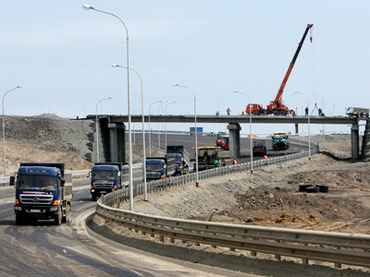
Russia Mulls Tax Breaks to Encourage Far Eastern Development
Publication: Eurasia Daily Monitor Volume: 9 Issue: 191
By:

The Russian federal government pledged to expedite development of the country’s Far Eastern regions by offering new tax incentives to local businesses and investors. In the meantime, the regional authorities indicated interest in keeping a greater share of the tax revenue.
In a sign that the government has prioritized regional development, on October 11, Prime Minister Dmitry Medvedev chaired a top-level cabinet meeting to discuss government-supported programs to develop the country’s Far East and the Baikal region. Medvedev conceded that the Far Eastern and Baikal areas, or nearly one third of the Russian Federation’s territory, remained underdeveloped. Therefore, he concluded that regional infrastructure projects have “strategic importance.” Medvedev also suggested offering tax breaks to new companies created in the Far Eastern regions (The Russian governmental press-service statement, October 15).
Since 2008, the authorities disbursed one trillion rubles ($32 billion) to finance the federal program of the economic and social development of the Far East, the Russian prime minister noted, suggesting extending the program until 2018. Medvedev also pledged to disburse 28 billion rubles ($901 million) to finance another relevant program on the development of the Kuril Islands until 2015. Furthermore, he suggested increasing the capital of the Far Eastern Development Fund. The fund should act as a co-investor and aid private businesses in implementing projects with limited economic viability, he said. The fund, created by the state-run VEB bank, is currently capitalized at 500 million rubles ($16 million). Medvedev also voiced hopes that projects designed to prepare for the APEC summit meeting last month in Vladivostok have contributed to the economic development of the region (The Russian governmental press-service statement, October 15).
The implementation of the federal program of economic and social development of the Far East focuses on infrastructure and energy projects. It includes some major projects such as the Blagoveschensk, Yakutsk and Sovetskaya Gavan power plants, as well as the Yakutiya-Magadan electricity transmission line (Prime-TASS, October 11).
The Russian officials lost little time in following Medvedev’s orders. The Russian Ministry of Economic Development drafted proposals on future tax exemptions to be offered to new Far Eastern enterprises, Deputy Minister Sergei Belyakov announced on October 11. However, he conceded that the proposals to partially exempt businesses from profit, land and property taxes remained unapproved by the finance ministry (Prime-TASS, October 11).
Meanwhile, the regional authorities disclosed their own development blueprint. The Association of Far Eastern Regions drafted its version of a development program that also included tax exemptions for new businesses for up to 3–5 years. This program stipulates the creation of special economic zones with a preferential customs regime. According to the program, the regional authorities should keep a larger share of the tax revenue. It also envisages the development of the transportation infrastructure so as to cut transport costs. This is particularly important in the Russian Far East. Vyacheslav Shprot, the governor of Khabarovsk region, conceded that many regional businesses remain uncompetitive due to high logistics costs and electricity tariffs. He also said that many local companies are forced to pay low salaries to employees in order to keep afloat (RG daily, October 11).
The Russian federal government has also tried to lure foreign investors to the country’s Far Eastern regions. On October 15, Medvedev urged foreign businesses to invest in the region. The government will be working proactively to develop the country’s Far East, including transportation, communication and other infrastructure projects, he said. The prime minister invited foreign investors to take part in these efforts (The Russian governmental press-service statement, October 15).
The Kremlin has insisted that the development of the Far East should continue to be a major priority. However, it remains to be seen whether the planned tax incentives will actually prove instrumental in facilitating regional development programs and, notably, the costly projects to modernize the regional infrastructure.




